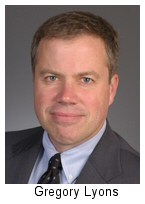Martindale-Hubbell Connected Launches Today
.jpg) With a base of 1 million lawyers, Martindale-Hubbell launches its Connected online social network today. It's been in beta testing for several months and currently has 3,000 members.
With a base of 1 million lawyers, Martindale-Hubbell launches its Connected online social network today. It's been in beta testing for several months and currently has 3,000 members.
Here's what makes it different from LinkedIn, Facebook, Legal OnRamp and the ABA's LegallyMinded:
- It's for lawyers only, an attractive feature for attorneys. Compare it to the success of the Texas Bar Circle, an online social and professional network exclusively for Texas lawyers, which is winning awards and new members.
- All users are authenticated. Unlike Twitter, LinkedIn and Facebook where anyone can claim to be anyone they want, Connected users are verified. The Connected online network doesn't allow any Gmail or Yahoo accounts -- you must have a law firm email address. There is no anonymity nor any screen names.
- It suggests people to connect with, based on where you went to law school, where you practiced earlier -- law firm or in-house -- and court documents you worked on with other lawyers. You'll get 40-60 names of lawyers you can connect with at the moment you join.
- It's got heavy media support from the ABA Journal, Law Technology News, the American Lawyer, Legalweek.com and other media outlets.
- Lawyer networks like Lex Mundi, the Minority Corporate Counsel Association and Terralex are hosting their own online networks on Connected.
- 25,000 legal articles by lawyers and firms are available, similar to the material you find on Mondaq.
 Martindale is late to the party with Connected, and there's been buzz that it will fail. But knowing that the John Lipsey is the brains behind the network, I think it will succeed. Martindale has finally figured out Web 2.0.
Martindale is late to the party with Connected, and there's been buzz that it will fail. But knowing that the John Lipsey is the brains behind the network, I think it will succeed. Martindale has finally figured out Web 2.0.
Any lawyer can join. You don't have to have a Martindale-Hubbell listing, but if you do, it speeds up the registration.
It's got all the basics -- a profile with privacy settings, ease of making connections, the ability to make announcements, forums, groups (that have a membership directory), blogs, RSS, news, in-mail and podcasts. For me, the Legal Management Forum had discussions I found interesting, such as job opportunities, killing the billable hour and women lawyers struggling for pay parity.
Beyond that, you can search narrowly for a particular lawyer in a specific city, or broadly for all lawyers in a practice area in a state. The link to Professional Resources offers links to lawyer associations, lexisONE and free case law, a list of experts and CLE courses, to name a few.
Features to be added include sending broadcast messages to all your connections, access for marketing professionals, and "preferred provider" management for in-house counsel to keep track of lawyers whom they are referring cases to.
If you are a lawyer looking for another lawyer for help with a file, a referral, local counsel, past and present colleagues, and new lawyer contacts locally or out of town, you'll find them at www.martindale.com/connected.
 From the
From the 
 From my friend Joshua Fruchter's blog
From my friend Joshua Fruchter's blog  Bankruptcy and Litigation Most In-Demand Specialties
Bankruptcy and Litigation Most In-Demand Specialties  The new issue of
The new issue of  In this first of a three part series of articles on how to market a mediation/ADR practice, Diana Mercer, Esq. advises finding a Signature Style for yourself to keep your marketing genuine. This involves figuring out how to be yourself in your business development and find your niche. Her specific recommendations can help any lawyer improve how they market their specialty services.
In this first of a three part series of articles on how to market a mediation/ADR practice, Diana Mercer, Esq. advises finding a Signature Style for yourself to keep your marketing genuine. This involves figuring out how to be yourself in your business development and find your niche. Her specific recommendations can help any lawyer improve how they market their specialty services.
 Hat tip to Staff writer Correy E. Stephenson of
Hat tip to Staff writer Correy E. Stephenson of  The recession isn't affecting 900-lawyer McGuireWoods, which just entered the London market by acquiring a firm there.
The recession isn't affecting 900-lawyer McGuireWoods, which just entered the London market by acquiring a firm there.  Excerpted from the
Excerpted from the  Wolf Block Chairman
Wolf Block Chairman 
.gif)
 According to Doug Cornelius, who writes the
According to Doug Cornelius, who writes the  New York Times columnist and author Thomas L. Friedman recently posed this question: "What if the crisis of 2008 represents something much more fundamental than a deep recession? What if it’s telling us that the whole growth model we created over the last 50 years is simply unsustainable economically and ecologically and that 2008 was when we hit the wall — when Mother Nature and the market both said: “No more.”
New York Times columnist and author Thomas L. Friedman recently posed this question: "What if the crisis of 2008 represents something much more fundamental than a deep recession? What if it’s telling us that the whole growth model we created over the last 50 years is simply unsustainable economically and ecologically and that 2008 was when we hit the wall — when Mother Nature and the market both said: “No more.”  As the data shows, hardly anyone uses Ask.com, Msn.com or Yahoo! No wonder ask.com is advertising on TV for users.
As the data shows, hardly anyone uses Ask.com, Msn.com or Yahoo! No wonder ask.com is advertising on TV for users.  There's a new online magazine for "women in litigation" called "Sue" (get it?)
There's a new online magazine for "women in litigation" called "Sue" (get it?) I found the following on the
I found the following on the  As a business-to-business marketing platform, Twitter has legs. About 56% of Twitter users say they use the online social communication site for business purposes, according to
As a business-to-business marketing platform, Twitter has legs. About 56% of Twitter users say they use the online social communication site for business purposes, according to  How do you follow up a law firm marketing brochure that features a clock shot through with bullet holes, and an inside page that says, "
How do you follow up a law firm marketing brochure that features a clock shot through with bullet holes, and an inside page that says, "
 Whenever a client walks into marketing consultant
Whenever a client walks into marketing consultant  Cross-selling is a key to success in business development strategies. While true, simply making introductions between partners in different practice areas is not enough. As Goodwin Procter found, the most successful cross-selling initiatives are aligned with the business strategies of clients and prospective clients to showcase depth, not just as a way to generate business, but as a way of helping clients to run their businesses better.
Cross-selling is a key to success in business development strategies. While true, simply making introductions between partners in different practice areas is not enough. As Goodwin Procter found, the most successful cross-selling initiatives are aligned with the business strategies of clients and prospective clients to showcase depth, not just as a way to generate business, but as a way of helping clients to run their businesses better.  “This joint platform began to crystallize as the national financial crisis began to unfold,” said
“This joint platform began to crystallize as the national financial crisis began to unfold,” said  From the
From the 


